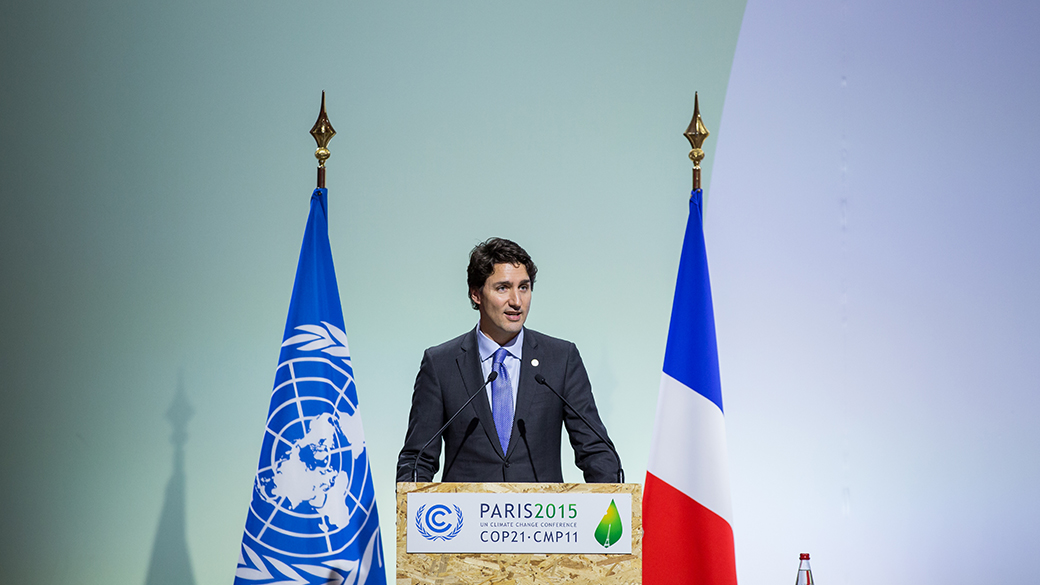
Address by the Right Honourable Justin Trudeau, Prime Minister of Canada
CHECK AGAINST DELIVERY
I am honoured to represent Canadians at this historic meeting.
My message is simple. Canada can and will do more to address the global challenge of climate change.
We will do so because the science is indisputable, and tells us that our planet is already changing in ways that will have profound impacts on our future.
And we will do so because it’s the right thing to do, for our environment and our economy, and as part of the global community.
Our government is making climate change a top priority, and our actions will be based on five principles.
First, we will act based on the best scientific evidence and advice.
Second, we will support and implement policies that contribute to a low-carbon economy, and this will include carbon pricing.
Third, and very importantly, we will work with our provinces, territories, cities and Indigenous leaders who are taking a leadership role on climate change.
Indigenous peoples have known for thousands of years how to care for our planet. The rest of us have a lot to learn. And no time to waste.
But they are not alone. Canadian cities have also long been leaders in the fight to create clean growth and combat climate change.
There’s a lot that we, in other orders of government, can learn from our cities.
Fourth, we will help the developing world tackle the challenges of climate change.
Many of the world’s most vulnerable countries have done little to contribute to the problem, but face the most significant consequences.
And all countries deserve the right to develop, and this development can and should be based on access to clean energy technologies.
Finally, we view climate change not just as a challenge but as an historic opportunity.
An opportunity to build a sustainable economy, based on clean technology, on green infrastructure, and on green jobs.
We will not sacrifice growth; we will create growth.
I want to highlight the participation at COP 21 of several provincial and territorial premiers.
Our provinces have taken a leadership role in Canada with regard to climate change.
In the months to come, we will develop a pan-Canadian climate change framework, to assist us in implementing the Paris agreement.
This will include national emissions-reduction targets and, more importantly, a concrete plan to achieve them.
Policy options will be informed by the best economic and scientific evidence.
These options include carbon pricing, support for energy efficiency, clean electricity and transport, and sustainable buildings and infrastructure.
Adaptation will be a core focus of our efforts.
And the plan will be flexible to the circumstances and policy approaches of the provinces and territories. From cap-and-trade to a ban on coal-fired electricity generation. From world leading innovation on carbon capture and storage to a revenue-neutral carbon tax.
We can learn from and build on these models.
We will also emphasize innovation.
We will support sectors ranging from energy to forestry to agriculture, as they develop technologies to reduce emissions, create high-quality jobs, and contribute to long-term sustainable economic growth.
Our plan will build on the efforts of local governments, indigenous organizations, businesses, youth, the academic community, and non-governmental organizations, many of whom will be represented in Paris in the coming days.
Canada will take on a new leadership role internationally.
We will participate in collaborative initiatives, such as Mission Innovation and the Carbon Pricing Leadership Coalition and we will seek out opportunities to work bilaterally or multilaterally, beginning with our North American partners.
We believe climate finance is critical.
Our commitment of 2.65 billion dollars over five years towards initiatives will help developing countries reduce their emissions and adapt to climate change.
These efforts can bring about transformative change through increasing access to energy and poverty alleviation.
A Paris agreement should reflect a new reality.
The world has changed for the better.
Global development has increased at a rapid pace.
But this means that we are going to need the efforts of those countries that are now in a position to help others reduce their emissions and adapt to climate change.
The agreement also requires a prominent role for the private sector and multilateral institutions to mobilize finance.
Those who can act, must.
COP 21 provides an opportunity for leaders to overcome old divisions and forge an ambitious, meaningful agreement, and an effective path forward.
Collectively, we are already rising to the task, with more than160 countries representing over 90 percent of global emissions having committed to taking action.
This is unprecedented.
But the latest science tells us that we need to do more.
Canada looks forward to playing a constructive role at COP 21.
Our delegates are focussed on finding common ground to achieve an agreement with strong commitments and ambition, one that all parties are able to adopt and implement.
We have an opportunity to make history in Paris - an agreement that supports a transition to a low-carbon economy that is necessary for our collective health, security, and prosperity.
Canada is back, my good friends.
We are here to help.
To build an agreement that will do our children and our grandchildren proud.
Thank you.

